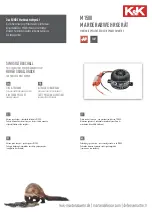
A-14 Appendix
PLZ-4W
We assume that the overcurrent protection (OCP) setting I
OCP
is less than the cur-
rent produced by the tripping of the overpower protection (OPP) and denote the
voltage of the battery as V
M
. In CR mode, if the resistance is decreased
(R
M1
→
R
M2
→
R
T
) to increase the input current (load current), the operating point
moves along segment MT (M
1
→
M
2
→
T).
When the overcurrent protection (OCP) setting is I
OCP
, the OCP trips when point T
is reached. At this point, two types of operation are available on the PLZ-4W
depending on the protection action setting of the OCP.
If Protect Action is set to LOAD OFF, the load is turned off.
If protection action is set to LIMIT, the PLZ-4W sinks current as a constant current
load at point T. Even if you attempt to increase the current by decreasing the resis-
tance, the current is limited at point T. If you decrease the current by increasing the
resistance, the OCP is cleared. The PLZ-4W returns to CR mode, and the operating
point moves along segment MT.
Table A-9 OCP action (protect action)
If the overcurrent protection (OCP) setting is I
OCP1
, the OCP does not trip as the
resistance is decreased to increase the current. Consequently, the operating point
reaches point S.
Here, the operation mode is CV. The voltage is
fi
xed to voltage V
Q
set in advance.
In this case, the operating point moves along segment QS. The current is determined
by the battery voltage and its internal resistance.
Point T
LOAD OFF
Turns off the load (stops the current
fl
ow).
The PLZ-4W no longer operates as a load.
LIMIT
CR mode ends. OCP continues, and the PLZ-4W
sinks current as a constant current load.
Summary of Contents for PLZ-4W Series
Page 10: ...VIII Contents PLZ 4W ...
Page 20: ...1 10 General Information PLZ 4W ...
Page 38: ...2 18 Installation and Preparation PLZ 4W ...
Page 90: ...5 30 Basic Operation PLZ 4W ...
Page 192: ...9 10 Specifications PLZ 4W ...
Page 214: ...A 22 Appendix PLZ 4W ...













































